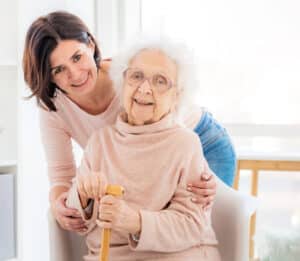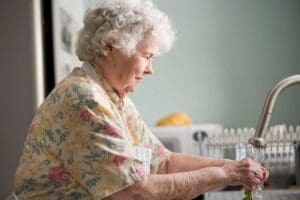If your elderly family member needs support with daily activities due to an illness or disability, he or she might be eligible for the CDPAP program. CDPAP is a New York State Medicaid program that allows eligible beneficiaries to hire their children, friends, or relatives for caregiving services.

That is excellent news because you can pick someone you know and trust, instead of having to rely on strangers to provide care for your loved one. The program benefits the elderly caregiver as well. They get to assist someone they love while getting compensated for their time and effort through Medicaid.
However, choosing the right person is not a simple task, even when you’re dealing with friends and family. It is critical to find a good fit, both for the job and the care recipient.
With that in mind, here are four things to look for when picking the right home care personal assistant for your elderly family member.
1. Does the caregiver understand the recipient’s needs?
The caregiver must have a thorough understanding of the recipient’s care needs for the relationship to be successful. Do they require assistance with daily activities like grooming, bathing, or household chores? Or maybe they need help with their medications and doctor’s visits?
Have a process in place that allows the caregiver to get familiar with all the required tasks. Create an in-depth job description, train the caregiver, and follow up regularly to address any questions or concerns.

2. Does the caregiver have any relevant experience?
Ideally, you will find a caregiver with some experience. Maybe they have helped out with family members of their own. Or perhaps they have volunteered at an assisted living center. At the least, you want someone passionate about helping seniors live a better life.
Other things like background checks and reference letters could be relevant depending on how well you know the caregiver. If you go with a close friend or relative, that is most likely not necessary.
3. Does your loved one get along with the caregiver?
Perhaps one of the most critical aspects of the caregiving relationship is how well the care recipient gets along with the caregiver. If they don’t enjoy spending time with each other, it is unlikely that the relationship would last long, and you’ll have to go through the entire process all over again.
Involve the care recipient in the process as much as possible. Ask for their input and include them in the interviews. After all, they’re the ones who will be spending time with the caregiver, and it must feel right to them.
4. Is the job a good fit for the caregiver?
Finally, you must make sure that caring for your loved one fits in with the caregiver’s own life. They must be clear on the time and effort expected from them, how much they’ll be compensated for it, and how that affects their schedule, school, or work. The arrangement must work for all the stakeholders for the relationship to be sustainable.

How to Choose the Best Caregiver for your Elderly Loved One
Choosing the best caregiver for an elderly loved one involves several steps. Here’s a compilation of advice from various sources:
-
Consider Your Loved One’s Needs: Assess what kind of assistance your loved one requires. This could be help with daily activities, medical care, or companionship.
-
Gather Recommendations: Seek advice from friends, neighbors, or healthcare professionals who have employed caregivers. They can provide names, phone numbers, and share their experiences.
-
Set Up Consultations and Interviews: Schedule meetings with potential caregivers or agencies. This gives you a chance to discuss your needs and expectations, and get a sense of whether they would be a good fit.
-
Check for Professional Certifications: Ensure the caregiver has the necessary qualifications and licenses for the required level of care.
-
Conduct Background Checks: Whether you’re considering an individual caregiver or an agency, it’s crucial to verify their background to ensure your loved one’s safety.
-
Know Your Criteria: Every caregiver has a different specialty when it comes to caring for the elderly. Make sure you have a clear understanding of what you’re looking for in a caregiver.
-
Do Extensive Research: Look up agencies and individuals you are considering. Check for reviews or any red flags.
-
Hire and Follow Up: Once you’ve hired a caregiver, maintain open communication and regular check-ins to ensure your loved one is receiving the best care.
Remember, choosing a caregiver is a personal process, and it’s important to trust your instincts about what feels right for your loved one.
Final Thoughts
Picking a caregiver for your loved one can seem like a daunting task. Being up-front with your needs and expectations will make the process more straightforward, and it will go a long way to making sure that your family member gets the care that they deserve.
Share This Article